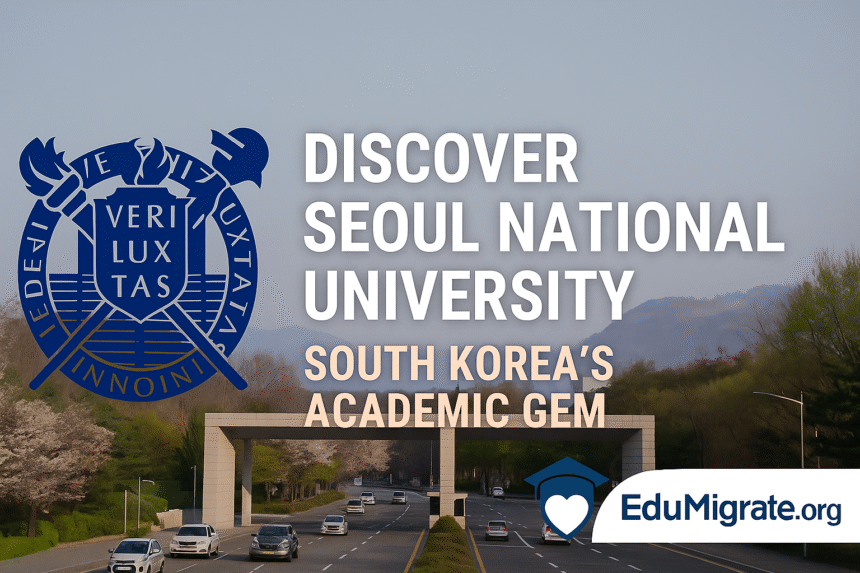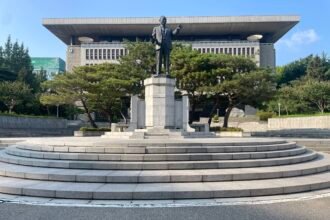Seoul National University, commonly called SNU, is South Korea’s top university and a beacon of academic excellence. Established officially in 1946, SNU represents the pinnacle of higher education in the country (reddit.com). Known for its rigorous programs and global outlook, this university attracts ambitious domestic and international students aiming for excellence.
📍 Where Is SNU and What Makes It Special?
Located on a green campus in Gwanak-gu, Seoul, SNU has a sprawling environment with modern buildings, libraries, and clubs (en.wikipedia.org). Since its establishment, SNU has grown to offer a rich mix of academic programs:
- 16 colleges and one large graduate school, plus 12 professional graduate schools (en.wikipedia.org).
- Example colleges: Humanities, Engineering, Natural Sciences, Business Administration, Medicine, and Music.
- Professional schools include Public Health, Law, Dentistry, and International Studies among others (en.wikipedia.org).
Because it is one of the elite “SKY” universities (Seoul, Korea, Yonsei), gaining admission to SNU is extremely competitive—and seen as a major advantage for students’ future careers (en.wikipedia.org).
📝 Admission: Who Can Get In?
Domestic Students
In South Korea, students take a high-stakes test called the CSAT. SNU requires top scores—often in the top 0.5% for some majors—making it a dream school for high-achievers .
International Students
SNU welcomes students globally. Key requirements include:
- Undergraduate: High school diploma, strong GPA, SAT/ACT sometimes.
- Graduate: Bachelor’s degree for Master’s programs; Master’s for Ph.D. candidates.
- Language: Korean-taught programs need TOPIK (often level 3+); some graduate programs are in English, usually requiring TOEFL 80 or IELTS 6.0 (inworldstudentcampus.com, makeoverarenaedu.com).
- Holistic review: GPA, test scores, recommendation letters, personal statements, and sometimes interviews.
Reddit users confirm that SNU’s international admission process is intense and GPA matters, but strong extra-curricular work and personal essays can help (reddit.com).
💵 Tuition Fees & Cost of Living
Tuition Fees
Costs vary by program and student nationality:
- Undergraduate:
4–6 million KRW per year ($3,000–$4,500) . - Graduate:
5–7 million KRW ($4,000–$6,000) . - Ph.D. programs may be slightly higher.
On-Campus Housing
Dorms cost about 300–600 USD per month (scholarshipsfuture.com).
Living Costs
Typical monthly living costs in Seoul include:
| Spending Category | Monthly Cost (USD) |
|---|---|
| Food & groceries | 200–400 |
| Transport & extras | 150–250 |
| Accommodation | 300–600 |
Total monthly estimate: 700–1,200 USD (scholarshipsfuture.com).
🎯 Why Study at SNU?
- World-class academics: SNU leads in research, especially in tech, engineering, medicine, and social sciences.
- Broad program choices: With 80+ undergraduate and nearly 100 graduate programs, students have many fields to explore (en.wikipedia.org, scholarshipsfuture.com).
- Strong global reputation: Prestigious alumni network, partnerships worldwide, and name recognition that opens doors in Asia and beyond.
- Research advantage: Innovative facilities like the Lee Sang Gak Telescope show the university’s push for global scientific impact (ischoolconnect.com, arxiv.org).
- Locale benefits: SNU is in Seoul—an international, high-tech, vibrant city full of job and culture opportunities.
🎓 Scholarships & Financial Support
SNU offers many scholarships, especially for international students—from full funding to tuition waivers and living cost support. Here are the most notable:
🔹 Glo-Harmony Scholarship
- For students from developing countries (ODA list).
- Full tuition waiver + 600,000 KRW monthly stipend.
- Covers up to 8 semesters (scholarshipsfuture.com, inter-korea.com, topikguide.com).
🔹 Graduate Scholarship for Excellent Foreign Students (GSFS)
- For Master’s/Ph.D. students.
- Full tuition waiver, 500,000 KRW monthly stipend.
- Covers up to 4 semesters (gyandhan.com, globalscholarships.com).
🔹 SNU President Fellowship (SPF)
- For Ph.D. students from developing countries who are university faculty.
- Full tuition waiver, 1.5–2 million KRW per month, airfare, insurance (universityliving.com, gyandhan.com).
🔹 Silk-Road Scholarship
- For students in humanities/social sciences from Silk Road countries.
- Covers tuition, up to 600,000 KRW monthly stipend, airfare, language training (gyandhan.com).
🔹 Korean Government Scholarship Program (KGSP/GKS)
- Covers tuition, monthly living allowance (~900,000 KRW), airfare, insurance.
- For Bachelor’s, Master’s, Ph.D. students accepted through SNU or embassy track (universityliving.com).
🔹 Other Scholarships
- Daewoong Foundation: One-time 2 million KRW award to undergraduates (topikguide.com).
- Korean War Memorial Foundation: Full tuition, dorm costs, 500,000 KRW stipend for war-veteran descendants (topikguide.com).
- SNU Global Scholarship: Undergraduate and graduate tuition plus living costs for about 80 students each year (universityliving.com).
- University-based merit & work-study awards available every semester (physed.snu.ac.kr).
In total, many international students receive partial or full support. Over 500 students each year benefit from these offerings .
🏫 Campus Life & Student Support
SNU offers many clubs and student societies—international student clubs, sports teams, academic groups, volunteering groups, and cultural organizations. A “buddy” system pairs new international students with current students (reddit.com).
Language Support
- Korean Language Education Center helps students learn Korean through classes early in their stay (en.wikipedia.org).
- Scholarships (e.g. SPF, silk-road) include language training (gyandhan.com).
Work-Study Options
- Graduate assistantships, research roles, hourly coach positions are available with pay and tuition support .
- International students can work part-time on campus.
Cultural Integration
Living in Seoul means immersion in Korean culture: food, language, technology, and pop culture. While many classes are in Korean, SNU supports international students and some programs are taught in English .
📅 Application Timeline
While details vary per program, a general overview:
- Prepare materials: transcripts, certificates, test scores, essays.
- Apply online: via the SNU admissions portal, often early March for Fall intake .
- Select scholarships: tick relevant boxes during application.
- Wait for results: interview stages for some scholarships.
- Visa application: after acceptance (if you’re an international student).
- Arrival & orientation: attend orientation, register for language or core courses.
Reddit users say competition is steep—application volumes are high—but applicants with strong GPAs, essays, and extracurricular records have real chances (reddit.com).
🧭 Pros & Cons of Choosing SNU
✅ Pros
- Top-quality education recognized worldwide.
- Generous financial aid and scholarship packages.
- Strong research facilities and innovation culture.
- Vibrant, international campus and cosmopolitan city experience.
❌ Cons
- High competition to secure admission.
- Living expenses in Seoul can be high.
- Korean language still key for daily life and integration.
- Work culture may involve long hours and pressure—it may not be easy to balance academic and personal life (reddit.com).
🎙️ Voices from SNU Students
Reddit users note:
“SNU apparently doesn’t accept transfer students from abroad. … Cheap tuition? Cost of living in Seoul is sky high.” (reddit.com)
“I am currently in my second year at SNU…you will need the ability to understand Korean… many classes … only in Korean.” (reddit.com)
Another student adds:
“I got into SNU with a 40 [IB score] … grades … extracurricular activities … so is your essay.” (reddit.com)
Exchange students mention:
“They had a buddy system… it is a blast!” (reddit.com)
These voices show that while SNU is tough to get into, those who join find a supportive, dynamic environment.
👍 Final Tips for Prospective Students
- Start early: Collect documents, prepare TOEFL/IELTS or TOPIK scores ahead of time.
- Aim high with grades: Your GPA and academic records matter a lot.
- Craft strong personal statements: Highlight leadership, goals, and fit with SNU.
- Apply for scholarships: Remember deadlines for GKS, Glo-Harmony, SPF, etc.
- Learn Korean basics: While some classes are in English, daily life and research often require Korean.
- Engage on campus: Join clubs, use the buddy system, and make friends.
- Budget wisely: Living in Seoul can be expensive; plan for 700–1,200 USD monthly costs.
📌 Summary
Seoul National University offers world-leading education with strong scholarship support and vibrant campus life. It requires hard work, strong academics, and thoughtful planning. But for those who make it, SNU can be life-changing—opening doors to global careers and research opportunities.







Great post. I was checking constantly this blog and I am impressed! Extremely helpful info particularly the last part 🙂 I care for such info much. I was looking for this certain info for a long time. Thank you and good luck.